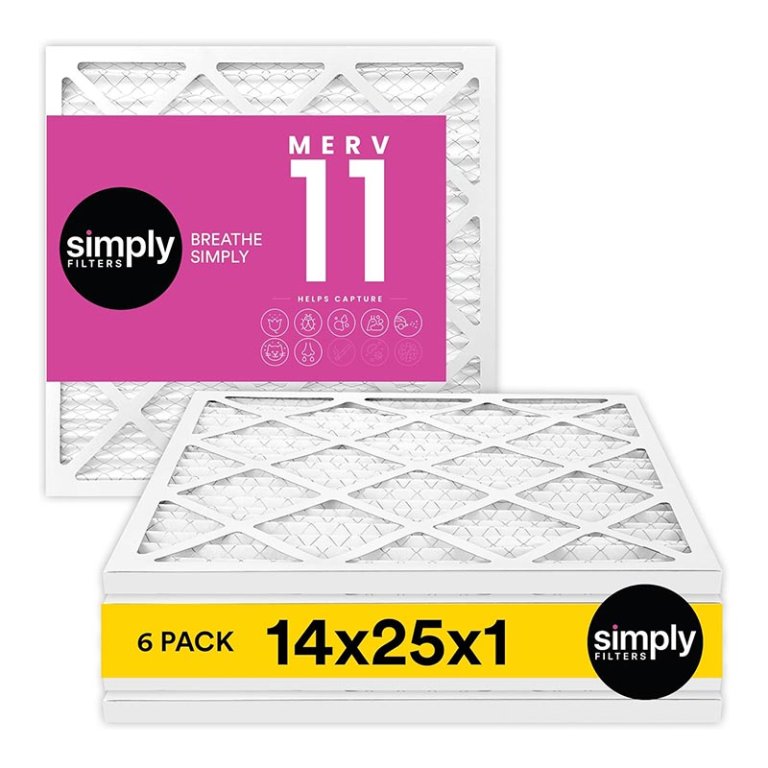We may earn revenue from the products available on this page and participate in affiliate programs. Learn More ›
Air filters for furnace and home AC are designed to trap dust, dirt, bacteria, and other small particles. Depending on the MERV rating of the house air filter (which measures how well a filter removes particles), it may even be able to trap viruses and other microscopic debris. By removing contaminants from the air, the furnace filtration system improves indoor air quality and protects the internal components of the furnace and AC from the pollutants the return duct takes in.
Furnace and air conditioner filter replacement is essential for the ongoing health of the HVAC system. Our top choice is the Simply Filters 14x25x1 MERV 11 Air Filter, which is designed to trap dust, mold, pet dander, pollen, and even auto exhaust. Additionally, this replaceable air filter has a pleated and electrostatic construction for trapping contaminants, and it works with most furnace and AC brands. Use this guide to learn more about air filter replacement and discover our selection of the best air filters for furnace and home AC.
Best Overall
Simply Filters 14x25x1 MERV 11 Air Filters
See ItWhat We Like
- Pleated and electrostatic construction traps contaminants
- Wide array of sizes accommodates different HVAC systems
- Comes with 6 filters, each lasting up to 3 months
- Catches particles, dust, and debris as small as 1 micron
What We Don’t Like
- Does not filter ultrafine particles including tobacco smoke, bacteria, and viruses
Product Specs
- Type: Disposable pleated electrostatic
- Size: 13.75 inches long by 24.75 inches wide by 0.75 inches thick
- MERV rating: 11
Available in a range of sizes, this pack of six disposable air filters by Simply Filters is our top choice. Each air filter has a pleated and electrostatic design that attracts and traps dust and debris as small as 1 micron. The MERV 11 rating indicates that the air filter is effective against pollen, dust mites, mold, dust, pet dander, auto exhaust, and small allergens, though it does not filter ultrafine particles such as tobacco smoke, bacteria, or viruses.
The high pleat count improves capture coverage while optimizing airflow and air filtration efficiency for up to 3 months before the filter needs to be replaced. When it’s time to replace the air filter, refer to the airflow arrows on the filter frame to ensure it’s installed correctly. For best results, it’s recommended to use this air filter in conjunction with an air purifier or other allergen-reducing measures.
Get the Simply Filters air filters for furnace and home AC at Amazon, Walmart, or Simply Filters.
More Air Filters for Furnace and Home AC That Are Worth Your Money
Choose one of the best furnace and AC air filters for home use from the products listed below to protect the HVAC system and improve indoor air quality.
- Filtrete 16x25x4 MERV 12 Air Filter, available at Amazon, Lowe’s, or Walmart.
- BestAir 16x25x4 MERV 11 Air Filter, available at Amazon, The Home Depot, or Walmart.
- Aerostar 16x25x1 MERV 13 Air Filter, available at Amazon, Walmart, or Target.
- Filtrete 20x25x1 MERV 12 Air Filter, available at Amazon.
- Nordic Pure 20x25x4 MERV 12 Air Filters, available at Amazon, The Home Depot, or Nordic Pure.
- Filterbuy 20x20x1 MERV 8 Air Filter, available at Amazon, Walmart, or Filterbuy.
What to Consider When Choosing an Air Filter for Furnace and Home AC
Furnace and air conditioner filters are integral to the ongoing operation of the HVAC system, so it’s important to find out what you might not know about HVAC air filters. Learning more about air filters for furnace filtration can help you determine what to look for when choosing a furnace filter’s replacement, including the type of air filter and MERV rating, as well as furnace and air conditioner filter sizes.
Types of Air Filters for Furnace and Home AC
Before picking up the first air filter you find, it’s a good idea to determine which type of air filter is best for the home and existing HVAC system. Even the best HVAC brands typically offer a variety of air filter options to choose from, so it’s recommended to learn more about home air conditioner filters, including washable, disposable, fiberglass, pleated, electrostatic, and polyester air filters.
- Washable air filters can last for years before needing to be replaced, though you will still need to remove and wash the reusable air filter about once every 3 months to prevent dust, dirt, and other debris from clogging the filter.
- Disposable air filters typically need to be replaced every 3 months, though filters in some homes may last longer than others depending on the number of people, number of pets, and how frequently the home is used. Some homeowners choose to invest in one of the best air filter subscriptions to ensure the HVAC air filter is replaced on schedule.
- Fiberglass air filters are a suitable option for rental properties or vacation homes that are not used very often. While fiberglass filters are inexpensive, they typically have a MERV rating of only 2 or 3, meaning they have little to no effect on air quality.
- Pleated air filters are made from polyester or cotton paper and are available as washable or disposable, depending on your needs. These air filters can range in efficiency from a MERV rating of 6 to 16, so it’s important to pay attention to the differences between specific products.
- Electrostatic air filters are also available as either disposable or washable. These are good AC filters that use a self-charging electrostatic cotton or paper fiber to trap dust, hair, and other small particles. You can expect most electrostatic air filters to have a MERV rating between 8 and 10.
- Polyester air filters are usually reusable, allowing you to keep the same air filter for years before needing a replacement. However, these air filters generally have a MERV rating of only 8 or 9, though this may be a suitable filter efficiency level depending on the home.
MERV Rating
Even the best energy-efficient air conditioners will suffer if they are not equipped with an appropriate air filter. Deciding on the right air filter can be difficult, though, without understanding the terms used to measure the filtration quality and efficiency. MERV stands for minimum efficiency reporting value, which is a number assigned to a product based on its density and filtration capabilities.
Andrew Hulsebos, service director for Reiner Group, a heating and air conditioning company in northern New Jersey, says that the MERV rating system ranges from 1 to 20, and that higher numbers indicate a higher level of filtration. “For residential use, air filters are typically rated between MERV 5 to 13.” Higher-efficiency filters are mainly used in commercial settings or health facilities that are equipped with powerful HVAC systems that are capable of drawing the air through the dense filters.
Filter Size
Furnace and AC air filters are available in a wide range of sizes and thicknesses, so it’s necessary to check the HVAC system operating manual to determine the right size for your system. Generally, if the filter needs to be bent, jammed, or otherwise forced into position, it’s too big. Similarly, the air filter may be too small if it doesn’t come within an inch of all four corners of the air handler slot or frame.
The easiest way to determine the right size air filter for the home is to check the existing air filter. The measurements are usually listed on the frame of the filter, making it easy to find the size. Alternatively, you can measure the existing air filter with a tape measure, or even measure the air intake slot to find out the appropriate size air filter for the HVAC system.
FAQs
Homeowners will want to stay on top of a range of maintenance tasks to keep the home functional and comfortable, but knowing exactly what needs to be done isn’t always obvious. Before purchasing replacement air filters for furnaces and home AC, it’s worth checking out the answers below to some of the most frequently asked questions about HVAC air filters.
Generally, furnaces and AC units will use the same air filter. “They share the same air handler, where the filter is located, which means you don’t need to worry about buying separate filters for each system,” says Hulsebos.
The most common HVAC configuration for residential properties typically involves the furnace and air conditioner sharing the same air filter, so to properly maintain the air conditioner, the furnace filter will need to be replaced or washed when necessary. How often to replace an air filter depends on the number of people and pets, and the frequency with which the home is used. On average, though, you should replace the filter about every 3 months.
The number of air filters in a house tends to depend on the size of the home, including the square footage, number of floors, and the number of HVAC units. Generally, a single air filter is enough for most residential properties, though larger homes may have more than one HVAC unit, each requiring at least one air filter.
HEPA air filters are often considered high-quality products with excellent filtration capabilities. However, Hulsebos notes that “part of the reason that HEPA filters are so rarely used in HVAC systems is that they are extremely restrictive in terms of airflow.” HEPA filters can also be expensive, difficult to clean, and typically need to be replaced every 6 to 12 months.
Residential HVAC systems usually require a filter with a MERV rating between 5 and 13. Air filters with higher MERV ratings may be able to filter smaller particles, but they may put unnecessary stress on the HVAC system as the blower attempts to force the air through the dense filter. So while a higher MERV rating can be better, the air filter needs to be paired with a suitable HVAC system for optimal performance.
Generally, the maximum MERV rating for a residential furnace is 13, though commercial or health care facilities may have more powerful HVAC systems that can operate normally while using air filters up to MERV 20.
The most commonly used air filter in an HVAC system is a pleated air filter. This is because it has high filtration capabilities and a relatively low price. These air filters can generally be purchased online or from a local home improvement store, though some grocery stores may also carry pleated air filters.


